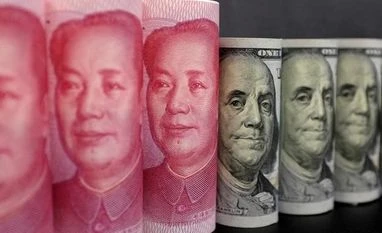China's foreign exchange reserves unexpectedly rose for the first time in eight months in February, rebounding above $3 trillion as a regulatory crackdown and a steadying yuan helped staunch capital outflows.
The rebound in reserves could ease fears in global markets that China will engineer another sharp one-off devaluation of the yuan, which would run the risk of inflaming trade tensions with the new US administration under President Donald Trump.
Reserves rose $6.92 billion during February to total $3.005 trillion, their first increase since June 2016, central bank data showed. That compared with a drop of $12.3 billion in January, when reserves fell to $2.998 trillion.
Economists polled by Reuters had expected forex reserves to drop by $25 billion in February.
Capital Economics said last month's rise suggests China's central bank "purchased foreign exchange in February and that capital outflows stalled".
But the consultancy added that the picture "is murkier than usual around Chinese New Year, when port and bank closures disrupt both trade and financial flows".
More From This Section
China's markets closed for a week for the Lunar New Year holiday, which began at the end of January.
The State Administration of Foreign Exchange, the foreign exchange regulator, said in a statement that China's foreign exchange reserves are likely to stabilise gradually as pressures on capital outflows ease.
The dollar gained against non-dollar currencies on the international market in February, but prices of assets in which China had invested its foreign exchange reserves increased, the SAFE said.
"Obviously, the sentiment has improved in the Chinese renminbi (yuan) more recently," said Andy Ji, Asian currency strategist at Commonwealth Bank of Australia in Singapore.
"But the increase didn't necessarily reflect capital inflows."
Firms, after snapping up dollars in past months, are selling them back to the central bank given more stringent capital restrictions and higher yuan interest rates, Ji said.
Tightened rules
China has tightened rules on moving capital outside the country in recent months as it seeks to support the yuan currency and stem a slide in reserves.
It burned through nearly $320 billion of reserves last year but the yuan still fell 6.5 per cent against the dollar, its biggest annual drop since 1994.
The yuan has steadied in recent weeks as the dollar's rally lost steam. The Chinese currency gained 0.2 per cent in February, and is up 0.8 per cent in 2017.
However, expectations of US interest rate hikes beginning as early as next week have rekindled fears that the yuan could come under renewed pressure.
Trump had said during the election campaign that he would declare China a currency manipulator on his first day in office, but his advisers now say they will wait for a final verdict from a US Treasury currency report due in mid-April.
Some analysts noted a subtle change in the language used to describe the yuan in Premier Li Keqiang's annual work report on Sunday had sparked some speculation that policymakers were now less willing to defend the Chinese currency.
China will allow bigger fluctuations in the yuan this year, a policy adviser told Reuters on Monday, speaking on condition of anonymity.
"I cannot say the (yuan) depreciation will be bigger than last year, but I can say its fluctuations will be bigger this year than last year," the adviser said.
People's Bank of China Deputy Governor Yi Gang, meanwhile, told reporters that Beijing will stick to its managed floating exchange rate framework to keep the yuan currency basically stable.
Tightening its grip
China's banks on Jan. 1 began requiring individuals using their $50,000 annual foreign currency quota to specify how and when they will use funds, with additional documentation sometimes required.
Authorities are also closely examining outbound investments.
The sports ministry, for example, has reminded Chinese investors to follow rules on moving capital overseas, after a huge splurge by Chinese buyers on foreign soccer clubs.
In addition to stepping up controls on money leaving the country, authorities have boosted efforts to bolster inflows.
The foreign exchange regulator said at the end of last month that it would allow foreign investors in the interbank bond market to trade forwards, forex swaps and options.
But restrictions on taking money out of the country may discourage foreign investors, despite recent assurances by the central bank that foreign companies were able to repatriate profits normally.
"While further tightening of capital controls since December is meant to forestall capital outflows, it may also wreak havoc on foreign direct investment and investor inflows," analysts at Bank of Tokyo-Mitsubishi wrote earlier this week.
)